Rise of the New Francophones
They cast off their chains a half-century ago. Many have emigrated to other lands. Their literary efforts cast light upon indignity, corrupt leaders, and the racial troubles in Europe. They now live and walk among us, telling stories of the clash between old worlds and new.
It has been said that this creature is too little known. We pause here for a bit of explanation.
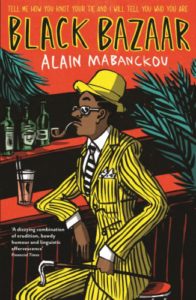 To begin with, they are French. Very, very French. But they are also not quite French. At least not through-and-through French. Francophones, you see, are not natives of France, but they speak and write and are educated in French.
To begin with, they are French. Very, very French. But they are also not quite French. At least not through-and-through French. Francophones, you see, are not natives of France, but they speak and write and are educated in French.
Add to that: a francophone shares not only the language, but the traditions and the history of French literature.
They are from nations whose “official” language is French but whose indigenous “unofficial” languages can number many more. They are descendants of a colonial past, steeped in their specific African or Caribbean cultures, versed in the French literary tradition. It is not so much a choice as it is an inheritance.
Where is home? The Democratic Republic of the Congo tops the list, but there are plenty of others, countries like Senegal, Cameroon, Niger, Chad, Morocco, even Martinique in the Caribbean.
A strange word, francophone—it has been around for a hundred years, but was not widely used until the 1960’s. It was popularized by French-African leaders who were keen to create a common cultural link among the various African independence movements.
But if francophone writers presume to belong to the greater world of French culture, they are nevertheless still vying for a level of acceptance that has come only grudgingly. If the Parisian literary establishment sees itself as the inner world, then francophones inhabit the outer world. It’s called la francophonie.
Among them, I have put my money on two very engaging and contemporary writers:
• Alain Mabanckou, Congolese novelist, scholar and critic. He has had his quarrels with the academics about the nature of French literature. His fiction is edgy and fractious, stubbornly realistic, often satirical, but still he is no outsider. He has famously written that he feels much closer to Louis-Ferdinand Céline than any “African foreigner” such as Nigerian writer Wole Soyinka.
• Fatou Diome, Senegalese writer and polemicist. She takes a more assertive stance, acknowledging the debt to her often high-minded step-motherland, but bristling at the tarnish of second-class citizen. Both her fiction and public stance are set in opposition to the status quo.
Modernist takes on native African folktales, biting satires of political corruption, bitter excursions into modern moral conflicts, acrid stories of emigres coping with the aftertaste of European influence. Times have changed.
Not a surprise, then, that these writers take on courageous, and not always popular, positions.
FATOU DIOME
“the belly of the atlantic” (2003)
English
Translation:
2006
In Europe, the refugee problem has been festering for decades, and francophone writer Fatou Diome has something to say about it.
By her witness, the sorry treatment of French immigrants from Africa has never been allowed a moment’s rest. Yet we learn from her that those who come to Europe, legally or illegally, are not just providing for Western society’s cheap labor needs. They are also fulfilling a destiny inherent in their own precolonial culture.
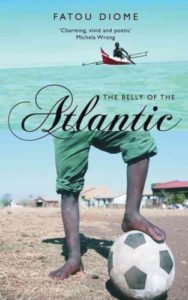 Diome’s many-layered first novel was a huge success on the continent when it first came out in 2003. The opening scene is a beautiful evening on Niodior—one of the westernmost islands of Senegal on the far west tip of Africa.
Diome’s many-layered first novel was a huge success on the continent when it first came out in 2003. The opening scene is a beautiful evening on Niodior—one of the westernmost islands of Senegal on the far west tip of Africa.
At the front of a house a crowd gathers, crazy with soccer. The TV is the only one in the village, with every futbol fan sidling up to get a glimpse of their heroes, among them the great Italian defender Paolo Maldini.
Young Madické is entranced, watching the game but annoyed with the play-by-play. French is not a language he can understand. It is the language of television, the language that “wears trousers, suits, ties, shoes with laces; or skirts, suits, sunglasses and high heels.” A player himself, Madické has dreams, big dreams.
During the game we swing back and forth between three fields of play: the field of battle on the soccer pitch, the field of Madické’s imagination as he heaves and struts during the game, and finally the field of memory—one small room in Strasbourg, France, where Selie, Madické’s older sister, is studying for her university exams and simultaneously watching and listening in.
Even from a distance of three thousand miles, Selie feels the agony of Madické. The score is tied at the end of overtime. At the outdoor gathering in Niodior, there is a long wait for penalty kicks. The old men talk. The little kids mingle. Madické paces and frets in quiet desperation.
Selie glides into reverie. She imagines the late afternoon sky in Senegal “fired up with passion” and “leaving a hanging trail of reddish light over the tops of the coconut palms.” She hears the drumming of women’s pestles, a “music that heralds the night” and marks “the hour of the veiled spirits.” France is her outward reality. Senegal is her heart and soul.
I tread European ground, my feet sculpted and marked by African earth. One step after another, it’s the same movement all humans make…. Yet I know my western walk has nothing in common with the one that took me through the alleys, over the beaches … of my native land. In Africa I followed in destiny’s walk, between chance and infinite hopefulness. In Europe, I walk down the long tunnel of efficiency that leads to well-defined goals. p.3
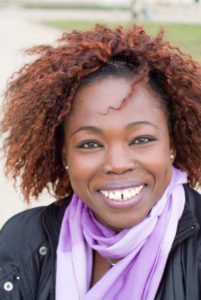
Fatou Diome
Diome’s prose is, from start to finish, magical—studded with metaphors that blend her acquired French sensibility with the metaphorical richness of a lost native land. France is to her an outpost, something of a postcard in sepia-tone. It is her Niodior that comes alive, a vibrant and colorful cinéma vérité even in its backwardness. In this daydream she sees the women in their pagnes, the men in their boubous, the village in all its small-minded charm.
For Madické, on the other hand, “emigration was the clay out of which he planned to model his future.” And his dream was to become a soccer star.
He had only one thought in his head: to leave, go far away, flying over the black land to touch down in the white land that burns with a thousand lights. … You don’t look back when you’re walking the tightrope of a dream. Go to see that grass … which is said to be so much greener, over there, where the local authorities pay people who clean up dog shit, over there, where even those who don’t work get a wage. Go to that place where fetuses already have bank accounts in their names, and babies have career plans. p.115
But to leave Senegal is to arrive in France, where the dreams of immigrants are seriously roughed up. Work is hard to find, paychecks slim. Flesh and blood optimism disappears. And back in Niodior, fantasies abound—based on an overly simplistic notion of success, and the tale-tellers who propagate the myth.
Wagane Yaltigé is the “rich city man” and former migrant who owned more pirogues than any other, but who never once attended a funeral of any of his fisherman who had been killed at sea.
Mousa is a soccer hopeful who was “discovered” by a “scout for a big French club,” and once in France was cut from the team; his “handler” suddenly claims that Mousa owed him over 100,000 francs; back in Niodior Mousa despairs of his future from his sense of worthlessness.
The Man from Barbès is a man of means who often returned from France with banknotes and trinkets, acquired five wives over the span of five trips home, and a house along with the one village television. Little did everyone know his “Senegalese fortune” came from a job as migrant laborer on the streets of Paris.
Monsieur Ndétare is “the foreigner,” a teacher at the French Primary school who also gave French classes to Madické after soccer practice, who also introduced Selie to French, to Hugo, Moliere, Balzac, and all the others—even Marx. Ndétare was getting old, a discarded socialist from the ‘70s. He was an outsider in the village and would always remain so.
We are immersed in this upside-down world of the immigrant, with many family members separated by borders and expired visas. In mid-book, Salie takes a return trip to Senegal, only to be treated as an outsider who has made it, the expat who leaves everyone else behind.
For me, returning is the same as leaving. I go home as a tourist in my own country, for I have become the other for the people I continue to call my own family. p.116
It is the immutable law of the émigré: the obligation to family. In this place the debt is universal, no different from all other cultures.
Exile is my geographical suicide. Stripped of my history, I am drawn to foreign lands because they don’t judge me according to the errors of fate, but for what I have chosen to be. An outsider everywhere, I carry an invisible theatre inside me, teeming with ghosts. To leave is to carry inside you not only all those you’ve loved, but also those you’ve loathed. p.161-162
FATOU DIOME
“Marianne porte plainte!” (2016)
English
Translation:
None
If Diome’s first novel was a plaintive lament, she has since moved on. Unfortunately, it has happened without us English-reading admirers, since the five books that followed have not yet been made available in translation.
Diome is widely known for breaking taboos. Notable among her subsequent novels is “Ketala” (2008), a story about a gay Senegalese man living in Europe. She has also become a speaker in demand, and a go-to personality for television debate.
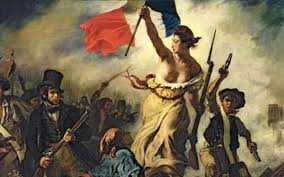
Marianne, inspiring the Revolution
The title character of this, her latest book-length essay, is known to all France. May I introduce you to … Marianne (pictured at right)—the idealized, feminine embodiment of the Republic. Marianne was born of the revolution in 1792. Her motto: “Liberty, Equality, Fraternity.” She is a figure whose leadership is indisputably patriotic.
2016 was a year of fighting for fairness and for the lives of immigrants themselves. In this book Marianne is put forth as impatient and querulous, a militant like Diome, fighting for equality, demanding fairness for every citizen. During this last French election, the author made this essay a cause célèbre for the struggles of migrants, immigrants, and the underclass.
The history of novelists and philosophers taking the stage in France is a long and storied one. This latest literary effort is both a screed against what she sees as bigotry, plain and simple, and a working paper toward a vision of a multiracial and multicultural society.
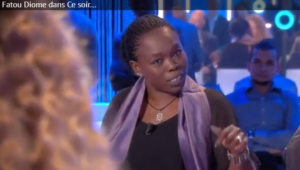
Diome in debate on French television
In France, the alt-right opposition prefers another idea, “assimilation.” So it is important to note that Diome must defend that controversial, hot-button word “multicultural” proudly and without blinking. While this slim volume arrives without a translation, we fortunately have an overview that gives us a picture of how this author comes across as both fire-breathing and clever. Here are a few lines from Rosemary Haskell’s academic take on it, published in “World Literature Today”:
In assimilation’s place, the author promotes “multiculturalism” through the embrace of traditional French secularism and its Enlightenment internationalist legacy of free thought. … It champions … Voltaire, Césaire, Senghor, and Montesquieu.
In other words, Diome comes out swinging, calling upon the best of French history, which is precisely what we would expect from her. She even compares the alt-right politician Marine Le Pen to the polygamous, patriarchal “old goats” of Africa, whose insistence upon their traditions essentially condemn their all-too-many offspring to poverty in this new world order.
For Diome “multicultural” is great word—a word without visa. It is, in her view, exactly what the archetypal Marianne marches for.
alain Mabanckou
“song of a migrating bird” (2016)
English
Translation:
2016
Alain Mabanckou left the Congo and took a graduate degree in Paris, thereafter working for a time in the corporate world. But he was also writing in his spare time, and publishing poetry. Later, he was encouraged to write more fiction. In part, it was his poetic style of fiction that caught fire with the public—and also caught the attention of University of Southern California, where he is now a permanent resident, Associate Professor of French and Francophone Literature. This essay is an intriguing contribution recently published in English in World Literature Today.
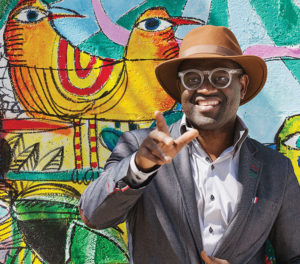
Alain Mabanckou
Mabanckou has made of himself a spokesman for a larger view. He is both native outlander and French speaker, both guest and member. He walks a delicate middle ground and yet pleads for a place for all modern French writers, whether they be called francophone or otherwise, in what is now being heralded as “World Literature in French.”
French “provincial” writers are no better off than their “francophone” counterparts, and for the Parisian establishment that considers them “local,” “pastoral” authors, they are a source of derision. There are in fact literary associations for these authors, even regional markets at which books can be found on display alongside stalls selling local produce such as foie gras, tapenade, or jars of homemade jam.
Mabanckou loathes the ever-present, patronizing compliment: “one of the most important francophone authors” or “one from the African continent who handles our language so skillfully” or “the African Voltaire” or “the tropical Céline.”
A self-satisfied and cheerful critic may even argue that these authors contribute to [French] global influence at a time in history when English is supposedly annihilating everything in its path.
Such remarks set up a relationship of subordination in which francophone literature ends up being considered purely for its social function, for what it brings to the French language. This has the effect of denying these writers any kind of creative agency.
But should one spend one’s life accusing the past or rather building a future? Our task consists in monitoring the progress of this World Literature in French, in delineating its contours, in considering it in a broader, expanded, explosive framework, that is to say the world.
Alain Mabanckou “Broken Glass” (2006)
English
Translation:
2009
If you’ve ever sauntered into a bar, ordered a drink and been cornered by one of the permanent residents, then you’ve probably met Broken Glass, or at least one of his many cousins. The dude starts by telling you a fantastic story, and in no time has you in his clutches.
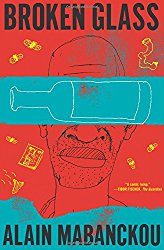 In each chapter, there is a story. The first is about a Christian uprising against the bar known as “Credit Gone West”—and about the President of the Republic who was one-upped in his election campaign by a political opponent who took advantage of the uprising, and used the phrase “I accuse” to blame the President for the outrage—all of which went viral in Pointe-Noire. The President, not to be outdone, demands that all his high-ranking ministers come up with a comeback slogan, a devastating phrase that will trounce his “I accuse” opposition. As each minister offers up one after another overused cliche (“I am the state”, “I have a dream”, “Religion is the opiate”, and so forth) he dismisses each of them as idiots … and the story goes on and on and on.
In each chapter, there is a story. The first is about a Christian uprising against the bar known as “Credit Gone West”—and about the President of the Republic who was one-upped in his election campaign by a political opponent who took advantage of the uprising, and used the phrase “I accuse” to blame the President for the outrage—all of which went viral in Pointe-Noire. The President, not to be outdone, demands that all his high-ranking ministers come up with a comeback slogan, a devastating phrase that will trounce his “I accuse” opposition. As each minister offers up one after another overused cliche (“I am the state”, “I have a dream”, “Religion is the opiate”, and so forth) he dismisses each of them as idiots … and the story goes on and on and on.
The bar is in the city of Pointe-Noire. “Broken Glass” is the chronic barfly narrating the entire set of stories. His friends are named “the Printer” and “the Pampers Guy” and “Zero Fault” and “Robinette”—which, if you think about it, are not so much pseudonyms as handles for his multitude of acquaintances. His wife “Diabolica” eventually gives up on trying to save him. The owner—who refused to submit to the Jerusalem Bible-throwing mob—is the “Stubborn Snail.”
The stories are a blend of character sketches, boastful misadventures, romance gone sour, business deals gone bad—and then, just when you realize your storyteller has revealed almost too much about himself—the darker shades of this man spilling out into the street—you are sharing with him that “no exit moment” in a life over which he has lost control.
If Broken Glass is pretty much a drunken mess, he is still a standard-bearer for decency and a narrator we love to listen to. By the end, we are prepared to follow him to his demise, if for nothing else than admiration for his basic humanity.
This book is refreshingly contemporary. And the French have rightly showered Alain Mabanckou with their usual acclaim and prizes galore, dubbing him the “African Beckett” and such. To me, he’s more of a Dostoyevsky—but the important thing is that the stories jump off the page.
Mabanckou himself admits that the intentional first-person stream-of-consciousness is meant to impart in French the unique patois of the Congolese, especially that of the street. The stories, even when tragic, have a plenitude of lively chatter packed full of asides—as in this example where “Broken Glass” takes a turn for the serious, and tells us the story of his mother’s horrid demise.
… she rose from her bed at midnight, in the clutches of a dreadful dream, walked down to the river Tchinoucka, and there reenacted in every last detail a scene from the Bible, she walked on the dirty water of the river Tchinoucka, as though she might cross over to my father in the other world, and then the dirty water of the river Tchinouka gulped her down into its belly, then spat her back out again like a piece of flotsam on the bank, saying it didn’t want her skeletal body in its watery belly, and the local cleaning workers came across her disfigured corpse, nibbled here and there by the small fry in the river and by other fish with no sense of decency, who were hanging around getting bored on the tide of the slimy wave, and the funeral wake was held at our place, on our lot, my mother’s body was laid out in the open air, according to the custom of Louboulou, and for this I must thank Diabolica … p. 120
alain Mabanckou “BLACK MOSES” (2015)
English
Translation:
2017
Mabankou, now in his 50s, typically writes books that are modest in length, but deliciously satisfying. He has been a prolific contributor, writer, essayist and activist. His novel “Memoirs of a Porcupine” (2006) addresses random violence. His “Letter to Jimmy” (2007) gained renown as a paean to James Baldwin and reflections on race in the art of writing. “The Lights of Pointe-Noire” (2013) is a memoir of growing up, also much admired.
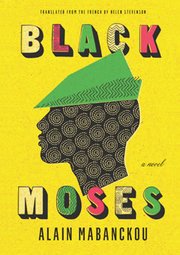 But “Black Moses” is different, a look-back for Mabanckou, and altogether a new turn into serious fiction. We are still ambling about in the vicinity of the Congo, still within this author’s house-of-mirrors—but then we look around, and suddenly it is the mid ’60s.
But “Black Moses” is different, a look-back for Mabanckou, and altogether a new turn into serious fiction. We are still ambling about in the vicinity of the Congo, still within this author’s house-of-mirrors—but then we look around, and suddenly it is the mid ’60s.
We are in Loango, a remote village quite some distance from Pointe-Noire. A small child, age 3, is summarily dropped off at the orphanage. The boy is warmly welcomed by the “pocket-sized” priest Papa Moupelo, who inscribes a new name for him upon a brand new birth certificate—Tokumisa Nzambe po Mose yamoyindo abotami namboka ya Bakoko. Translation: “Thanks be to God the black Moses is born on the earth of our ancestors.”
Moses is grateful for this new family, but change lurks on the political horizon. One day, the fatherly Papa Moupelo does not show up—it is about the same time as parcels of red shirts arrive for the students. Daily prayers are replaced by indoctrination, hymns are replaced by new songs of allegiance. Teachers are instructed to imprint upon the young minds slogans, and strange new words such as “dialectic.”
For the children, life gets more and more complicated. New rules abound. Dieudonne Ngoulmoumako and his nephews now run the place, a kind of bush-league kleptocracy that demands strict adherence to all kinds of arbitrary rules. Of course most of Moses’ life is populated with the lesser lights of the school: his timid but wise friend Bonaventure, and the employees he meets when carrying out his duties: Sabine Niangui, the half-Cuban cleaning woman and mothering spiritual guide provides some comfort now and then, and old Koukouba, the caretaker, tells stories of the fantastic.
Over time the orphanage becomes a rat’s nest of child cruelty. Two bullies in particular, Tala-Tala and Songi-Songi, seem more like trained torturers, and following their brutal takeout of Moses’ friend Bonaventure, Moses reaches the end of his rope and gets a modicum of revenge by poisoning their late-night snack with hot chili pepper. After their bout in the infirmary, though, his torturers gain a new respect for him. His handle becomes “Little Pepper” and eventually the three of them manage to escape from the orphanage with enough money to make it to Pointe-Noire.
In the city, the little boy that came from nowhere becomes someone: a tagalong in a loose knit gang of petty thieves. He seems to us a kind of “everychild,” though, with a wide-eyed curiosity and yearning for family.
But now the politicians and the political campaigns are for real. Mayor Francois Makele rids the city of low-life with his clean-up drive against the “mosquitoes of the Grand Marché” (basically a “militia armed with water guns, coshes, and tear gas”). Moses flees the random violence for a more stable life—specifically a whorehouse where “Maman Fiat 500” becomes his benefactor. She gets him a job as a dockworker, but when that explodes in his face, Maman quietly takes him back in as a runner for their many business needs.
Once again Moses is thrown back into to family. The girls and the ladies (“Volcano Fire,” “Eleventh Commandment”, “5:00 a.m. Nutella”, “Crumbly Biscuit”) make sympathetic friends. His work is easy. But then, just as things are settling down, another purge is announced. The persistent and ever-present corrupt politicians begin once again “making good on their promises.”
Impenetrable are the ways of the Lord, Papa Moupelo would have said. What with my little job at the port and my regular visits to Maman Fiat 500’s, I seemed to be leading a normal life, when with a great fanfare, the major, Francois Makele, the same one who had already driven us back to the Côte Sauvage with his famous ‘Grand Marche Mosquitoes’ operation, now launched ‘Zero Zairian Whores in Pointe-Noire.’ You’d have thought life was one long election campaign. He wasn’t actually running for mayor this time, but for the Presidency of the Regional Council of Kouilou. The tricks were the same though: choose a group to gang up on, and wage a noisy campaign, preferably with aggressive involvement of the forces of law and order and the TV cameras. p.148-149
The bulldozers do a complete demolition job on the whore houses. When Moses returns for a look, he thinks the Americans have bombed the hell out of that neighborhood in Côte Sauvage. He also learns that the girls were raped and summarily deported. He hears that a few simply landed in mass graves.
So yet again his life is blown to smithereens. With few options left, Moses is beginning to go just a little crazy. He seriously considers taking drastic steps, something that might fulfill the prophecy of his life. He buys a knife. He plots an assassination. He carries it out in a fit of waking dream.
Years pass. At the end we learn that Moses is writing this very memoir we are reading. From the confines of an institution for the criminally insane. Way out of town. Built on the site of his former orphanage.
Latest news on the francophone front
In late 2017, the best-selling Moroccan author Leïla Slimani was appointed to the post of Francophone Affairs Minister by the new President-elect of France, Emmanuel Macron.
The up-and-coming writer had won the Prix Goncourt literary award in 2016 for her second novel, “Lullaby” (based on the story of the New York killer-nanny) and is at work on a new book, “Sex and Lies,” about sexuality in Morocco. According to The Guardian, Slimani will be expected to “represent the open face of Francophonie to a multicultural world.”
So look, you gotta love the French. They do have that je ne sais quoi about their affair with francophones.
Incidentally, we do have a sister word, anglophone, which is similarly used, mostly among researchers to group English writers who are not native to England/America: Nigerians, for example. But really, the parallel ends there.
At this point in time, francophone topics couldn’t be more in the spotlight. The breadth of francophone literature is voluminous and growing. Even Belgian, Swiss and Canadian French writers are sometimes considered francophone.
So … once a francophone, always a francophone? It would appear so. In France, at least, you can’t shake the moniker.
Leave a Reply